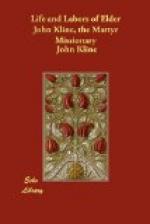I think it is clear that the corruption in the Corinthian church had broken out before John wrote. Paul tried to check this disorder by a letter, and instruct them in that way as far as he could at the time; but at the close he adds: “The rest will I set in order when I come.” I am free to express the belief here, that Paul wanted to see John and learn from him all about feet-washing and the Lord’s Supper. Up to this time Paul had not taught the Corinthian brethren anything about these ordinances. He had only taught them baptism and the Communion, as he had received them from the Lord by reading the accounts given of them in the records made by the other evangelists. Hence John finds it necessary to give a particular account of the institution of feet-washing and the Lord’s Supper, from beginning to end, with the same exact care that characterizes everything else which he has written. John can well record the words of my text: “And of his fulness have all we received.” Jesus has left nothing incomplete. There is fullness and completeness in his life and examples, in his doctrines and practices, and in his objects and their accomplishment.
Near the close of Paul’s life he wrote a kind of love letter to his son Timothy, as he calls him, in which he says: “All scripture is given by inspiration of God, and is profitable for doctrine, for reproof, for correction, for instruction in righteousness; that the man of God,” meaning the church, “may be perfect, thoroughly furnished unto all good works.” There is no place for a doubt in my mind that Paul wrote this letter to Timothy after John had made his gospel record. He therefore includes the Gospel recorded by John in his comprehensive expression that “all scripture is given by divine inspiration.” In this view of the case, Paul could well insert the words, “and is profitable for CORRECTION, for INSTRUCTION in righteousness,” because he himself had been corrected and instructed by it.
And now, brethren and sisters, and as many as hear me to-day, let us go to the fullness of his love as it is tied up in his Word. Let us open these bundles of grace with penitent hearts and tearful eyes, and the peace of pardon, like the odor of the ointment from Mary’s broken box, will flow over our souls. Then with joyful heart each one may say: “Of his fulness have all we received.” But we constantly need fresh supplies. We naturally run dry. The anaconda, it is said, can live three months on one meal. But he can do this only in a state of absolute inactivity. God does not expect us to live in a state of constant inactivity as this serpent does; he expects us to work for him, and the workingman has need of daily food and drink. Let us so live that we may all joyfully approach some one of the pearly portals of the Golden City, and receive the angel keeper’s welcome there: “Of his fulness hast thou received: enter thou into the joy of thy Lord.”
SUNDAY, March 9. Meeting at Lionberger’s schoolhouse. Romans 10 is read. Dine at Lionberger’s, and come to Abraham Rothgeb’s (Rodecap’s) on Mill Run, where we have night meeting, and stay all night. I speak from the latter part of Acts 3. Subject, “The Great Prophet.”




